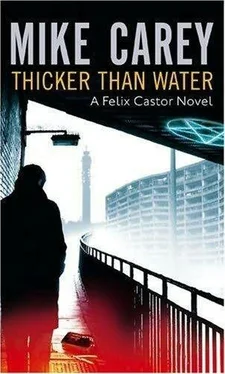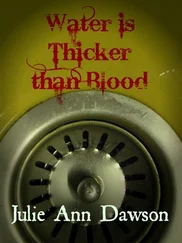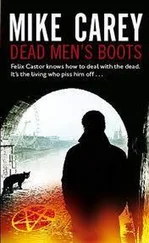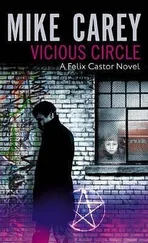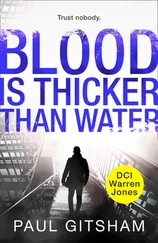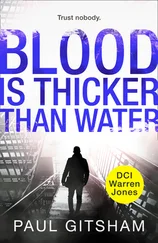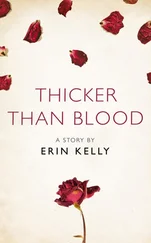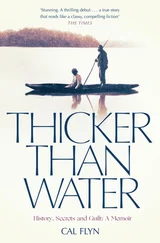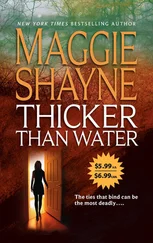But I could see, more or less, how the man I was staring at now could have been the boy I’d grown up with half a lifetime ago. And that recognition had the eeriest feel to it of all: I mean, obviously I’ve never woken up to find a horse’s head in my bed — yet — but as a memento mori Kenny had most of the competition beat cold.
I didn’t bother to look at his med chart because it wouldn’t have told me anything. I did look into the locker next to his bed, out of pure habit, and found nothing there except a plastic pitcher of water with a flip-close lid, a plastic tumbler still shrink-wrapped for your germ-free convenience and a Gideon Bible. If Kenny had had anything on him when they brought him in, someone had taken it away for safe keeping.
Which meant that Kenny himself was going to be my only source of information here. Maybe he’d obligingly be dreaming about the guy who took a razor to his brachio-cephalic artery, and I could just take a psychic snapshot as I drove by. But most likely not. The little tasters and teasers I get from skin contact are seldom coherent enough for that: it’s a long way from a video download.
I could have put my hand on Kenny’s forehead, but I didn’t want to: it had the wrong kind of overtones, somehow. Instead I pulled aside a corner of the blanket so I could touch his hand. Then I just stood there, stupidly, staring at his wrist with the blanket peeled back.
Anomalies with the interior of the car, Basquiat had said. Well, there were anomalies with Kenny, too, and I was looking at one of them. His wrist had been bandaged where he’d taken the cuts in the course of the attack, and the bandage was fairly wide. But the livid-edged furrows of older cuts, inadequately healed, showed clearly both above and below it. These weren’t defence injuries — not unless he lived with a ninja and they fought for the last Jaffa cake every day of the bloody week. These were the marks of old suicide attempts, or of regular, unremitting self-harm.
I reached out and touched the tips of my fingers to his open palm. Silence. Nobody home. I stood as still as I could, eyes tight shut, trying to find Kenny’s frequency through the emotional effluvia pooling all around me — the gone-but-not-erased emotions that had soaked into the hospital’s walls over the course of the last century and a half and now seemed to my strained perceptions to be sweating out of the brickwork.
I was picking up something, but it wasn’t much: a dimly flickering filament of consciousness like a 25-watt light bulb left burning somewhere in the basement rooms of Kenny’s mind — the psychic equivalent of a pulse. But I was getting nothing else: not memory, not emotion, not even the raw light-dark strobe of an untranslatable dream. Kenny wasn’t a good sender, and the conditions were almost as bad as they could be. It seemed I’d spent a lot of effort and ingenuity to no good end.
But then, acting on an impulse I didn’t consciously examine, I slid my hand across Kenny’s palm until the tip of my index finger touched the line of one of his old, half-healed wounds. Instantly, that faint pulse opened up like a hot red flower and I flinched from the shock of the contact, almost pulling my hand away.
What I was feeling was a mixture of contradictory emotions that turned around and through each other without merging, like oil in water. There was pain in there, sharp and real and narrowly focused: but the pain was shot through with a restless hunger that was almost erotic in its intensity, and riding on the hunger there was a sense of urgency, a formless conviction that translated as NOW, NOW, NOW, LET IT BE NOW.
It took a real effort not to step back, not to break the contact, because the emotions were so alien and so powerful: someone else’s excitement, someone else’s suffering and need flooding my synapses. I felt as though I was collaborating in an assault in which I was simultaneously victim and accomplice.
Images began to surface in the flow of emotion like corpuscles in plasma or felled trees on a rolling river. I saw a small, cramped room barely big enough for a bed and a chest of drawers, the top of the chest piled high with CDs and empty CD cases; the towers and walkways of the Salisbury, by day and then by night; and a hand, probably male, touching the surface of a broken mirror in which a face was reflected in jumbled jigsaw pieces. The face was eerily familiar, but I didn’t have time to reassemble that jigsaw before the ceaseless rush of thought carried it away from me again, brought me instead a razor, a bitter taste, a drumming, repetitive song.
I got the sword
I’m good because
I got the sword
I’m good because
I tried to screen the music out but it had an insane, viral insistence: it overwhelmed and effaced the other sensations one piece at a time until there was nothing else left but the pounding drumbeat.
I opened my eyes and pulled back my hand, stopping the drumbeat dead. My fingertip tingled and throbbed as though I’d touched a hot plate and a blister was starting to form.
‘He’s looking better than he was,’ said a voice from behind me. A woman’s voice: the nurse. A moment later I heard her footsteps coming towards me.
I managed not to turn.
‘Yeah?’ I answered. ‘How do you mean?’
She walked past me, brisk and businesslike, carrying a grey plastic bowl, half full of water, which she set down on the table next to Kenny’s bed. She had a towel and a flannel hung over one arm, and she laid them out too with practised, economical movements. From her pocket she took a bottle of liquid soap. She was a short brunette, broad at shoulder and hip and as formidable as her voice. She was probably about my age, but she wore it better. Most people do.
‘His blood pressure is up a bit,’ she said. ‘Sixty over forty. And his eyes are moving in his sleep — I saw that when I came in before. That’s a very good sign.’
There had to be some reason why she was talking to me like an old friend instead of asking to see my credentials or screaming for the cop on the door, and I’d figure it out sooner or later. For now I was content to gather whatever rosebuds were on offer.
‘What do you make of the wounds?’ I asked.
She straightened and looked round at me, looking a bit bemused. ‘What do I make of them?’
I nodded. ‘Sure.’
‘Well, you’re the expert.’
Okay. The penny dropped at that point. She couldn’t think I was a consultant on his rounds, so she must be mistaking me for one of Coldwood’s boys, stopping by to scrape up a bit more forensic evidence. It says a lot for the public perception of the Met that a guy who rolls in out of the night in a long coat with two days’ worth of stubble on his chin is taken to be one of London’s finest rather than a wino looking for a berth.
‘Yeah,’ I agreed, straight-faced. ‘I am. But you know how it is with experts: multum in parvo .’
The nurse blinked. ‘Multi what?’
‘Means “deep but narrow”, which defines me perfectly. ‘I’m –’ well I’d better not be Castor this time out, in case that name ended up on a charge sheet some time soon ‘Basquiat. Rudy Basquiat. Detective Sergeant. Who are you?’
She gave me an old-fashioned look and tapped the badge she wore on her ample chest. She was Petra Ryall, charge nurse . Right. I bet when she lowered her head and charged she’d be something to see.
‘Petra,’ I said. ‘What I mean is, I just look at things from one angle. And your angle is going to be different because . . .’
‘Because?’
‘Because I’m a tough, hard-bitten, cynical London cop and you’re an angel of mercy.’
Nurse Ryall grinned at me. ‘You think they’ll give us our own TV series?’ she asked.
Читать дальше
